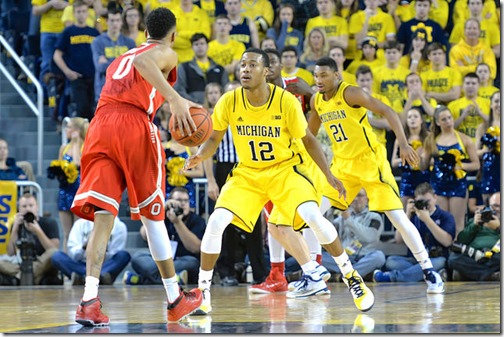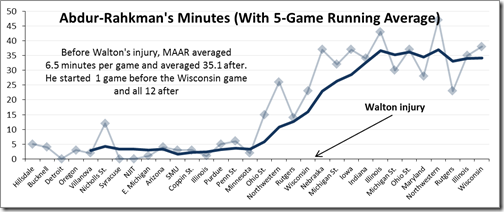season in review
Upchurch – MGoBlog
Michigan’s first stroke of bad luck came late in November: the Wolverines had just lost a hard-fought contest to eventual 1-seed Villanova in Brooklyn, but starting point guard Derrick Walton suffered some sort of toe injury – one that would affect him for the remainder of the year, eventually sidelining him for good in late January. It was evident that the injury sapped Walton of his explosiveness, both vertically and running in the open floor, but he played through it until his other foot was injured, most likely due to overcompensation for his original injury.
After a disappointing sophomore campaign, it’s prudent to recall exactly how good Walton was as a freshman. He started all but one game for a team that would come to the brink of a return trip to the Final Four and excelled in a modest role on offense. Derrick got better throughout the season: he posted a gaudy offensive rating (120.8) on a not-insignificant usage rate (18.4) in conference play while posting the fourth-highest free throw rate of qualifying players in the Big Ten; he was arguably Michigan’s best perimeter defender; he shot 41% from three on the season on 105 attempts. Expectations were naturally quite optimistic for the highly-touted Detroit point guard entering his sophomore season.
It’s hard to quantify exactly how much of Walton’s struggles were due to his injury, the stark decline in talent around him, or the burden of an increased role on offense, but the drop-off was so severe that the injury is the best explanation. After shooting an impressive 59% at the rim as a freshman, he shot 41% inside the restricted area as a sophomore – evidence that his toe was clearly bothering him. Derrick was still called on to play just shy of 40 minutes a game (barring auto-bench foul trouble in the first half) and, even though Spike Albrecht played well down the stretch, Walton was clearly Michigan’s first option at the point guard spot before his season-ending injury.
* * *
[After the jump: let's go back to the beginning]
Fuller – MGoBlog
For the second time in three years, John Beilein scrambled to fill some scholarships late in the recruiting cycle due to unexpected early draft entrees. The first time, he landed Caris LeVert – who’s since blossomed into perhaps the best NBA prospect Michigan’s had in years – and Spike Albrecht, already a cult hero among Michigan fans. The next duo to commit late in the process was Aubrey Dawkins and Muhammad-Ali Abdur-Rahkman: the two weren’t ready early in the year, but were thrust into big roles after key season-ending injuries to two starters. Abdur-Rahkman hardly played before Derrick Walton injured his foot; he was nearly indispensible afterwards:
Partially because Michigan was down to just two scholarship guards, Abdur-Rahkman’s minutes on the bench (usually due to first-half foul trouble) usually meant that Michigan would struggle to stay afloat in that time – Dakich and Lonergan weren’t ever meant to play many (if any) high-leverage Big Ten minutes, but they did. For example, consider Abdur-Rahkman’s best game, an efficient 18-point performance in a loss against MSU. When Rahk picked up his second foul with about ten minutes left in the first half, Michigan led by seven; when he returned to the court after halftime, Michigan was down five. They lost in OT.
To appreciate Rahk’s value – which doesn’t show up in his traditional or advanced metrics (low ORtg, TO rate > Assist rate, 29% from three, etc.) – consider the rotation guards Beilein’s had at Michigan. Of those, there are precious few plus defenders: Rahkman is likely on his way to becoming one, but Michigan hasn’t had a nominal stopper since Stu Douglass graduated. After so many offense-first guards and swingmen, having a guy who you can really trust on defense is another arrow in Beilein’s strategic quiver. Judging defensive value is always somewhat of a crapshoot, but it’s rather clear that – outside of a healthy Walton, perhaps – Abdur-Rahkman could very well be the best defender on the team.* If he improves his three-point shooting, he’ll be a strong candidate to retain his role, even with Michigan’s increased depth across the board.
*Caris LeVert’s defensive value is speculative at best, though he does have the most potential on that end of the floor for the next level. Besides, very few offensive focal points have enough energy to be similarly impactful on defense, especially in college.
[Hit the JUMP for more Rahkman talk]



1